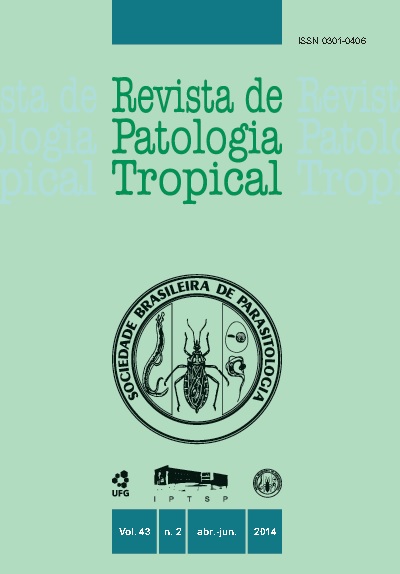ASPECTS OF ENTOMOLOGICAL SURVEILLANCE OF CHAGAS DISEASE IN SOUTHERN RIO GRANDE DO SUL, BRAZIL
DOI:
https://doi.org/10.5216/rpt.v43i2.31113Keywords:
American trypanosomiasis, entomological surveillance, Triatoma rubrovaria.Abstract
The objective of this study was to describe the triatomine species present in the region covered by the 3rd Regional Health Coordination of Rio Grande do Sul (3rd CRS) and evaluate aspects of entomological surveillance of Chagas disease from the notification of insects by the population. For this, the agents’ activities over this period were monitored and they were interviewed to ascertain the main difficulties encountered in the activities of the program. Over this period, 295 triatomineswere caught in nine municipalities. All of them were caught by members of the public (notifications) and were handed in at triatomine information centers. Among the municipalities in which larger numbers of specimens were caught, Canguçu (37.8%) and Piratini (28.8%) were prominent. The species for which the largest numbers of specimens were caught were Triatoma rubrovaria (93.9%) and Panstrongylus tupynambai (5.1%). The insects were predominantly caught inside homes and
during the hotter months. Regarding the agents, 95.2% reported that they had some difficulties in carrying out their duties. Inadequacies of transportation and scarcity of educational material for public distribution were cited as the main factors that caused difficulties. It was concluded that some municipalities present an ongoing risk of triatomine invasion in homes, especially regarding T. rubrovaria; maintenance of surveillance activities is of fundamental importance, and greater assistance for the work of agents acting within the program is needed.
Downloads
Downloads
Published
How to Cite
Issue
Section
License
The manuscript submission must be accompanied by a letter signed by all authors stating the full name and email address, confirming that the material has not been published or is under consideration for publication elsewhere, and agreeing to transfer copyright in all media and formats for Journal of Tropical Pathology. The authors will not be paid for published articles. They are solely responsible for the content of those articles, even if the Editor holds the right to adjust them to the norms of the journal.
The reviewers will not be paid for the peer review process.

